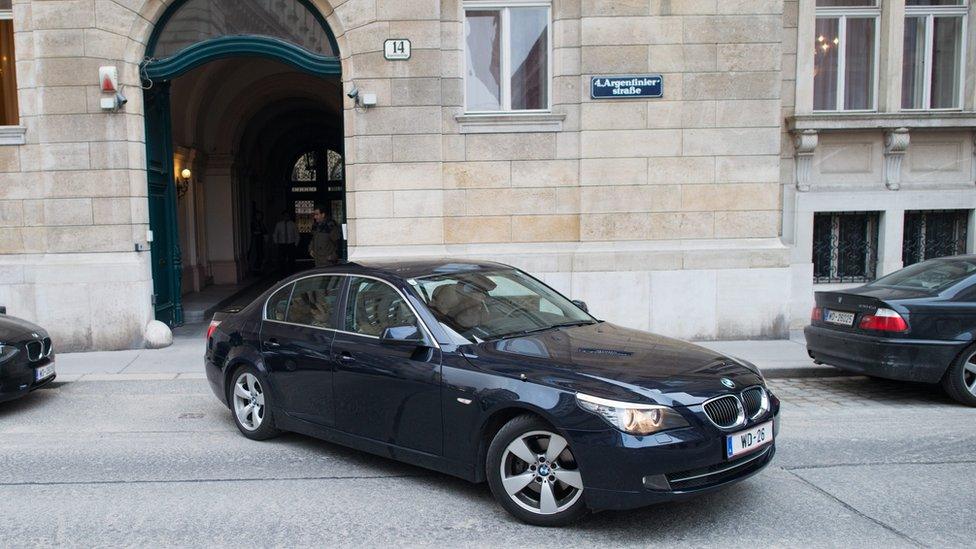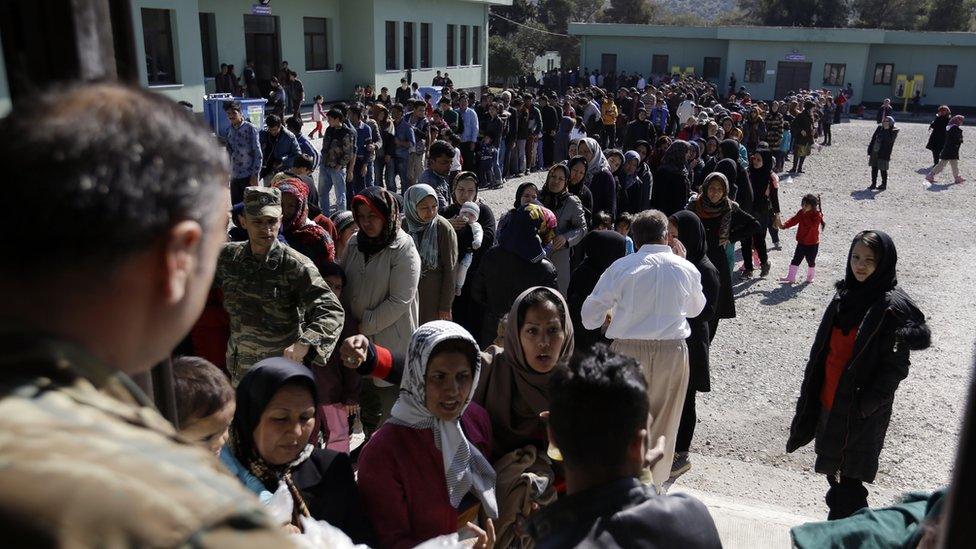Migrant crisis: Greece recalls ambassador from Austria amid EU rifts
- Published
Migrant crisis: Greece recalls ambassador from Austria amid EU rifts
Greece has recalled its ambassador to Austria amid sharp divisions among EU states over the migrant crisis.
It acted after Austria hosted a meeting with Balkan states on the migrant issue, to which Greece was not invited.
Meanwhile, EU and Balkan interior ministers met in Brussels to try to heal rifts over the migrant issue.
Speaking afterwards, the EU's migration commissioner warned the bloc's migration system could "completely break down" within weeks.
Dimitris Avramopoulos said member states had until a 7 March summit with Turkey to curb the number of migrants.
"In the next 10 days, we need tangible and clear results on the ground," he told reporters.
Austria, Serbia and Macedonia have taken their own steps to limit entry to migrants, angering Greece, which fears the controls will cause a bottleneck. The measures also threaten Europe's Schengen passport-free travel area that spans 26 countries.
EU migration: Crisis in graphics
Greece's foreign ministry said the ambassador was being recalled "in order to safeguard the friendly relations between the states and the people of Greece and Austria".
Problems facing the EU, it added, could not be addressed with "mentalities and extra-institutional initiatives that have their roots in the 19th Century".
Speaking in Brussels, Greek Migration Minister Yannis Mouzalas said his country would "not accept becoming Europe's Lebanon".
Lebanon is home to about a million of the four million Syrians who have fled to neighbouring countries.
In other developments
A French judge upheld an eviction order for up to 1,000 migrants under plans to demolish part of the Calais "Jungle" camp
Germany expects to accommodate 3.6m migrants by 2020, German media report, quoting internal government estimates
Ships from a Nato mission fighting human-trafficking in the Aegean Sea will work with Turkish and Greek coastguards, according to a new agreement, overcoming territorial tensions between the two neighbours
More than one million migrants arrived in the EU last year, many of them fleeing the civil war in Syria.
So far this year, 100,000 migrants have entered the EU illegally - nearly all of them arriving in Greece. More than 400 have died on the sea crossing from Turkey.
The surge in migration coupled with the failure to agree an EU-wide response has led to warnings about the bloc's survival.

The problems are only mounting: analysis by Damian Grammaticas, BBC Europe correspondent, Brussels
It is Greece that has recalled its ambassador from Vienna but it is really Austria that is the driving force in the current phase of this refugee crisis. And Austria's actions are frustrating not only Greece, but others too.
Austria's cap on the number of refugees allowed to cross its border was criticised as against international law but it has gone ahead anyway and the result has been a cascade of frontier controls in countries further south.
Now Vienna's decision to co-ordinate refugee policy with Balkan countries but not Greece has riled Athens, and it has exasperated Germany and the European Commission too.
Greece is finding itself squeezed from all sides. Thousands continue to land on its islands every week but many cannot now travel further north. As the numbers stuck in Greece build, the country's ability to cope is limited. Greece's economic crisis is not over.
Meanwhile Greece has been roundly criticised by the EU and other European countries for failing to manage the new arrivals properly. But the EU and other European countries promised to help by moving thousands of refugees from Greece and that has not happened. So the problems are only mounting.

On Wednesday, representatives from 10 Balkan states attended talks in Austria and agreed to co-ordinate action to limit the flow of migrants.
Greece, which was excluded, accused Austria of an "unfriendly act".
EU interior ministers meeting in Brussels on Thursday heard plans drawn up by Austria and Balkan countries that seek to restrict the numbers crossing their borders.

Greek ambassador Chryssoula Aliferi left the Greek embassy in Vienna on Thursday
Measures include fingerprinting all entrants and turning back anyone without a passport or holding fake documents.
The countries have also pledged to accept only those they deem to be in need of protection - interpreted by some governments as meaning only Syrians and Iraqis.

Over the weekend, Macedonia barred entry to Afghans at its border with Greece. Angry protests erupted at the border crossings and Greece was forced to transport hundreds of Afghans back to Athens.
About 2,800 people massed on Greece's northern border with Macedonia on Thursday but correspondents said only 100 were allowed to cross.
Greece has threatened to block all decisions at EU migration summits next month if member states do not agree to take in quotas of migrants.

Greece says its reception centres for refugees will overflow if other states close their borders
A note on terminology: The BBC uses the term migrant to refer to all people on the move who have yet to complete the legal process of claiming asylum. This group includes people fleeing war-torn countries such as Syria, who are likely to be granted refugee status, as well as people who are seeking jobs and better lives, who governments are likely to rule are economic migrants.